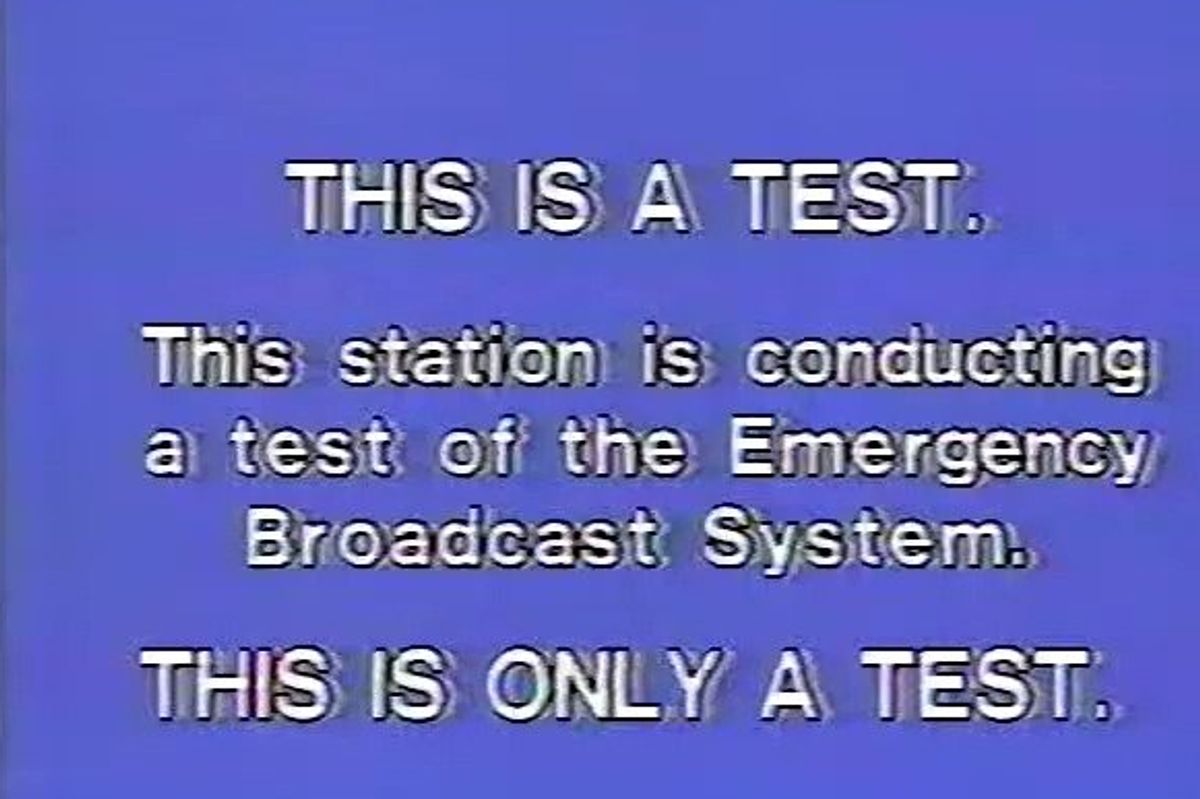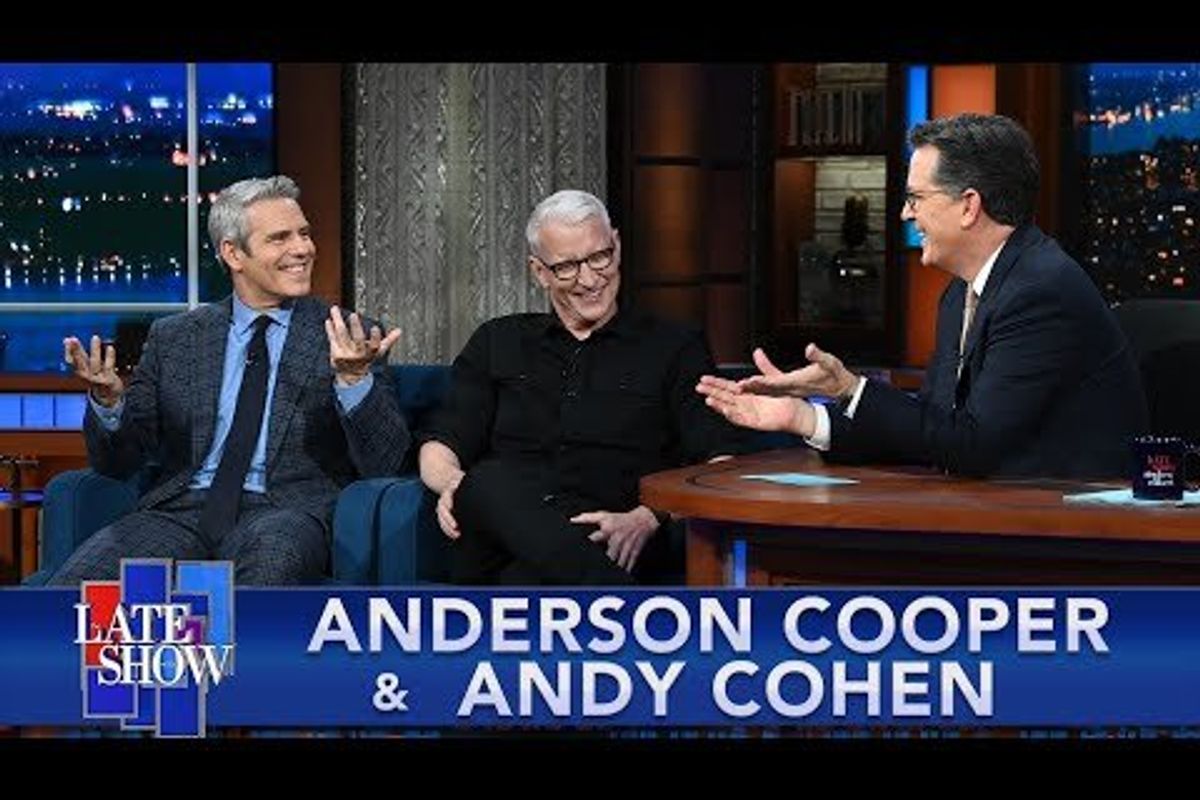Anderson Cooper can't stop giggling telling Colbert about 'embarrassing' childhood interest
"I can't even bring myself to say it. It's so lame."
Anderson Cooper and Andy Cohen discuss their childhoods on Colbert.
When it comes to reporting the news, CNN anchor Anderson Cooper is usually quite serious. After decades of reporting on everything from hurricanes to elections to wars, Cooper has earned 18 Emmys and two Peabody Awards.
But if you get so much as a thimble of alcohol in him (as his friend and New Years Eve co-host Andy Cohen likes to do)—Anderson is known to get what can only be described as a big old case of the giggles.
@colbertlateshow When you have a laugh attack with your bestie. 😂 Tag the @andycohen to your #AndersonCooper! #Colbert
On a recent episode of The Late Show With Stephen Colbert, Cooper and Cohen appear by each other's sides. Cooper says, "I was a very strange kid, clearly." But when Cooper begins to attempt to share what he was interested in as a child, he starts laughing in his trademark high-pitched, quick-fire giggle. Cohen pipes in with "He's drunk," which Cooper denies. Colbert tries to get the train back on the tracks and asks, "What were you interested in?" And now all bets are off. Cooper literally can't stop laughing, and the more he laughs, the more the audience laughs.
Again, Cohen says, "He's drunk, he's gone. One shot!" (Which may or may not have been true.) Colbert continues asking for the answer, and finally Anderson can get four words out. "I was interested in…" and again, a fit of laughter overwhelms him. Trying his best, he says, "I can't even bring myself to say it. I was…" and then again–uncontrollable laughter.

Colbert finally asks, "What as a child could you have possibly been so interested in that would make you giggle?" Fighting back tears of joy, Cooper says, "It's so lame." And the laughter returns. He finally pulls himself together, red-faced and amped up, and states, "As a child, I was interested in 'The Zulu Wars.'" (He is referring to the Anglo-Zulu War of 1879 between the British Empire and the Zulu Kingdom.) He can't get the word "Wars" out before bursting back into the giggles, and as Cohen says, "What?" and Colbert repeats, "Zulu Wars," Cooper has now physically slid down in his seat, arms crossed, laughter dialed up to 11.
Now Colbert knows how to have fun with it. He eggs him on, asking, "Like the Battle of Rorke's Drift? And Isandlwana and stuff like that?" To which Cooper laughs, nods, and says, "Yes," and then is immediately impressed by Colbert's knowledge on the topic.
What led up to that moment was equally charming, as Colbert pushed Cohen and Cooper to discuss what they were like as kids.
- YouTubewww.youtube.com, CBS
It's pretty adorable to see anyone laugh that hard, but what's even quirkier is the embarrassment Cooper seemed to feel about his childhood interest. He's not alone. Kids and teens can be into the darndest things for the most random of reasons. (At 14, I was really into Jungian psychology and made everyone discuss it ad nauseum.)
On a Reddit thread, someone asks, "What were your weird or bizarre childhood obsessions/interests?" And the comments most definitely didn't disappoint. The OP continues, "Mine were buoys. Yeah, buoys. My uncle was in the Coast Guard at the time (I was about 7), and he arranged a visit for me and my dad to go down to a shipyard. I remember spending hours wandering around these massive iron buoys."
A few people answered the more typical "dinosaurs" and "sharks." But this Redditor's brother had a more unique interest: "My brother was completely and utterly obsessed with those National Emergency Broadcast tests. Mainly just the electronic beeps it would make in the beginning. He would sit on YouTube and listen to them for hours on end. Whenever they came on TV, he would scream for everyone to be quiet and would turn on every single TV in the house. The sound now creeps me out pretty bad."

Now this one is even stranger: ""Paths. I can't really explain it. Especially two paths near each other." (That sounds like more of a spiritual pursuit than an interest, but cool nonetheless.)
This commenter bravely shares what was less of an interest and perhaps more of a strange compulsion: "I've heard that I used to bite the heads off Barbie dolls at my daycare."
Had that been the case for Cooper, I'm not sure he'd ever have gotten through the sentence without complete laughter-implosion.

